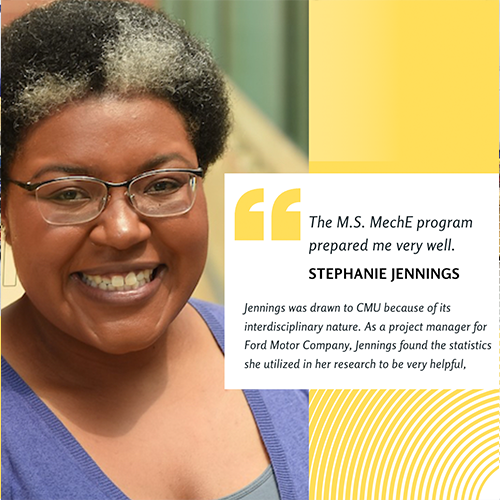Degree overview
In the advanced study degree you have the flexibility to choose from a range of courses to acquire depth in a technical concentration area. You will acquire the ability to work in teams to propose, plan, and execute projects to solve real-world problems through cohort based courses developed for masters students. This degree also provides opportunities to take courses offered by other departments in the College of Engineering, School of Computer Science, and Mellon College of Science.
Five concentrations are available:
- Design and manufacturing of mechanical systems
- Energy and thermal fluid systems
- Robotic and control systems
- Biomechanical Engineering and Medical Devices
- Self-defined (through petitioning the Department of Mechanical Engineering)
The curriculum goes beyond these specialties by incorporating course work and opportunities to develop and strengthen professional skills in leadership and communications.
Students pursuing the M.S. in AI Engineering - Advanced Study will be able to:
- Demonstrate graduate-level domain knowledge in mechanical engineering
- Apply math and engineering principles to solve problems found in practical settings
- Disseminate engineering work to a broad professional community via written and oral communication
- Acquire depth in one primary technical area
- Work in teams to propose, plan, and execute projects of engineering relevance
Internship and summer research opportunities
In this program, the summer semester is considered a vacation semester. You may elect to use this time to pursue optional experiences, such as:
- An internship to gain real-world professional experience in industry, the government sector, or in other areas.
- A summer research experience in your research advisor’s lab, an alternate lab at CMU, or at another institution.
- Volunteer work, summer classes, etc.
Post-graduation outcomes
Most of our graduates from this degree become engineering professionals in either industry or the government sector. Some employers include Accenture, Adobe, Air Force Research Lab, Roblox, and Westinghouse. More information on our graduate student outcomes is available in this interactive dashboard.
Our master’s degrees are self-supported or have an outside funding source (such as the student’s employer) to pay for tuition and living expenses. To see annual tuition rates, visit Carnegie Mellon’s The HUB website.
Note that immigration regulations do not allow Carnegie Mellon University to issue visa documents for part-time master’s degrees.
